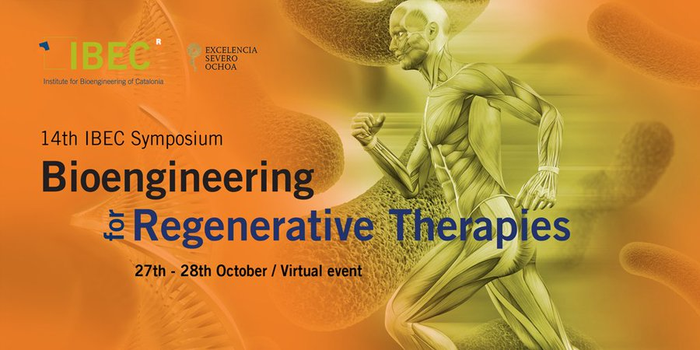“There is an urgent and growing need for human tissues and organs worldwide, many patients are waiting.” The words are from Jennifer Lewis, professor at the prestigious Wyss Institute at Harvard (USA), during her speech a few days ago at the 14th IBEC Symposium organized by the Institute for Bioengineering of Catalonia (IBEC). But responding to the demand of transplants is not the only pending question of the field called regenerative therapies.

Credit: IBEC
“There is an urgent and growing need for human tissues and organs worldwide, many patients are waiting.” The words are from Jennifer Lewis, professor at the prestigious Wyss Institute at Harvard (USA), during her speech a few days ago at the 14th IBEC Symposium organized by the Institute for Bioengineering of Catalonia (IBEC). But responding to the demand of transplants is not the only pending question of the field called regenerative therapies.
Can we regenerate or heal a heart after a heart attack, replace burned skin, or create mini-organs in the laboratory to test drugs? To try to respond to these, and many other health challenges, regenerative therapies seek to apply innovative approaches using biomaterials, biodrugs and cutting-edge techniques, such as 3D bioprinting, for the repair of injuries and the treatment of diseases. That is why regenerative therapies represent one of the application fields at IBEC of the so-called bioengineering for health. In this context, the Institute for Bioengineering of Catalonia (IBEC) recently dedicated its 14th Annual IBEC Symposium (virtual format) to present the latest advances in research in regenerative therapies.
International experts converge via Barcelona
The event, which took place virtually on October the 27th and 28th, was opened by the Director of IBEC, Josep Samitier, representatives of the Catalan Government and universities, as well as of other leading institutions, such as the Director of the Carlos III Health Institute, Cristóbal Belda, who highlighted the value of research for health, as well as the crucial role of IBEC in the biomedical ecosystem in Spain.
Afterwards, international speakers from IBEC and institutions from the USA, the Netherlands and the United Kingdom took the floor. Among others, the aforementioned expert in 3D bioprinting from the Wyss Institute in Harvard, Jennifer Lewis, the organoid expert from IBEC, Nuria Montserrat, the expert in cardiac regeneration from the Hubercht Institute in the Netherlands, Eva van Rooij, the expert in Reproductive Health from the IBEC Open Innovation Laboratory, Samuel Ojosnegros, the researcher Alberto Elosegui-Artola from the Crick Institute in London, or Professor Frank P. Luyt from the Netherlands. In addition to the plenary speakers, the entire scientific community was invited to participate, adding a total number of more than 300 registered attendees.
(Re)fabricating organs and tissues
Apart from reminding us of the urgent need to address the great problem of tissue demand, Professor Jennifer Lewis presented at the IBEC Symposium her work with a tool that can help find solutions: 3D Bioprinting. Thanks to it, Lewis and her team are one of the pioneers in creating in the laboratory the so-called organ-building blocks, which they apply to generate, for example, cardiac tissue systems.
But, despite the advances, the path towards the possibility of having access to regenerative therapies still involves some technical and economic difficulties. “It is already possible to create tissues, and patches with cells that show some regenerative effect, for example, for cartilage. The challenge now is to manufacture them in a reproducible, comprehensible, and large-scale way. Clinical trials are not easy for these types of therapies, but I am optimistic, and I believe we will see great advances in the coming years”, declared Professor Emeritus Frank P. Luyten of KU Leuven University in the Netherlands and member of the public-private organization “Regenerative Medicine Crossing Borders”.
We want to put the patients at the center of our efforts.
Nuria Montserrat, Group Leader at IBEC and Coordinator of the Spanish Platform for Biobanks and Biomodels.
“We are not yet able to perfectly produce organs or tissues with their full complexity, but we are capable to resemble some of their properties, and to understand much better something very important: the reasons why they become ill”, added Alberto Elosegui-Artola from the Crick Institute in London.
“At IBEC we are already able to create in the laboratory what we call “Organ-on a-chip”, small devices that make it possible to test samples from patients whether a treatment, for example, for muscular dystrophy, is going to work or not.” Declared Javier Ramón, IBEC expert and ICREA Professor who participated this week in an international symposium organized by IBEC and the Institute for Complex Molecular Systems (ICMS), a research institute of the Eindhoven University of Technology (TU/e).
“We want to put the patient at the center of our efforts,” said Nuria Montserrat, an expert and pioneer at IBEC in the so-called organoids or mini-organs, aggregates of cultured cells that constitute centimetre-sized tissues which help to study diseases and test new drugs. The ICREA Research Professor Montserrat also presented the Biobanks and Biomodels Platform of the Carlos III Health Institute, which she coordinates from IBEC, and which wants to contribute, thanks to organoids and other systems, to finding solutions to the great challenges in health.




